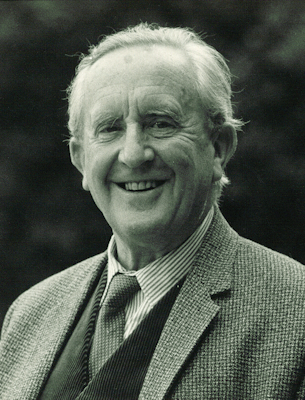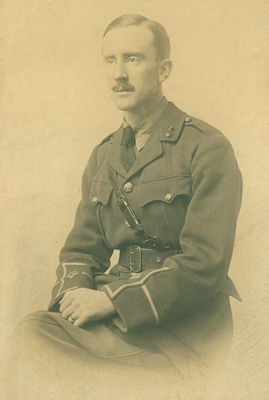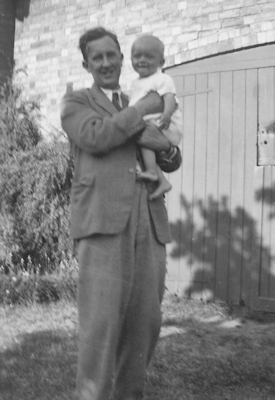Links to Bibliographies
The Big Three
--- Isaac Asimov
--- Arthur C. Clarke
--- Robert A. Heinlein
J.R.R. Tolkien
--- Introduction
--- Bibliography
Science Fiction and Fantasy Series
SF Universes and Fantasy Worlds
A Brief Biography of J.R.R. Tolkien (1892-1973)
 John Ronald Reuel Tolkien was an English writer, poet, philologist and university professor, best known as the author of The Hobbit, The Lord of the Rings and The Silmarillion.
John Ronald Reuel Tolkien was an English writer, poet, philologist and university professor, best known as the author of The Hobbit, The Lord of the Rings and The Silmarillion.
Tolkien was born on 3 January 1892 in Bloemfontein in the Orange Free State (now part of South Africa) to Arthur and Mabel Tolkien. Tolkien had one sibling, his younger brother, Hilary Arthur Reuel, who was born on 17 February 1894.
Tolkien travelled to England with his mother and brother in 1895, on what was intended to be a lengthy family visit. His father, however, died of rheumatic fever in Bloemfontein before he could join them. After a living with Tolkien's maternal grandparents, Mabel and her children moved to Sarehole, then a small village to the south of Birmingham.
Mabel Tolkien taught her two sons, and Ronald, as he was known in the family, was a keen pupil. She taught him a great deal of botany and awakened in him the enjoyment of the look and feel of plants. Young Tolkien liked to draw landscapes and trees, but his favourite lessons were those concerning languages, and his mother taught him the rudiments of Latin. He could read by the age of four and could write fluently soon afterwards. His mother allowed him to read many books. He later said that he disliked Treasure Island and The Pied Piper and thought Alice's Adventures in Wonderland by Lewis Carroll was "amusing but disturbing". He liked stories about Red Indians and the fantasy works by George MacDonald. In addition, the Fairy Books of Andrew Lang were particularly important to him and their influence is apparent in some of his later writings.
Tolkien attended King Edward's School, Birmingham, and later St. Philip's School, before winning a Foundation Scholarship and returning to King Edward's School. Mabel Tolkien was received into the Roman Catholic Church in 1900 despite vehement protests by her Baptist family, who then stopped all financial assistance to her. In 1904, when Tolkien was 12, she died of acute diabetes, aged just 34. Nine years after his mother's death, Tolkien wrote, "My own dear mother was a martyr indeed, and it is not to everybody that God grants so easy a way to his great gifts as he did to Hilary and myself, giving us a mother who killed herself with labour and trouble to ensure us keeping the faith." Prior to her death, Mabel Tolkien had assigned the guardianship of her sons to Fr. Francis Xavier Morgan of the Birmingham Oratory, who was assigned to bring them up as good Catholics. Tolkien grew up in the Edgbaston area of Birmingham.
At the age of 16, Tolkien met Edith Mary Bratt, who was three years older, when he and his brother Hilary moved into the boarding house in which she lived. With two people of their personalities and in their position, romance flourished. Both were orphans in need of affection, and they found that they could give it to each other. During the summer of 1909, they decided that they were in love. His guardian, Father Francis Morgan, viewing Edith as a distraction from Tolkien's school work and horrified that his young charge was seriously involved with a Protestant girl, prohibited him from meeting, talking to, or even corresponding with her until he was 21. He obeyed this prohibition to the letter, with one notable early exception which made Father Morgan threaten to cut short his University career if he did not stop.
In the summer of 1911, Tolkien went on holiday in Switzerland, a trip that he recollects vividly in a 1968 letter, noting that Bilbo's journey across the Misty Mountains is directly based on his adventures as their party of 12 hiked from Interlaken to Lauterbrunnen and on to camp in the moraines beyond Mürren. They went across the Kleine Scheidegg to Grindelwald and on across the Grosse Scheidegg to Meiringen. They continued across the Grimsel Pass, through the upper Valais to Brig and on to the Aletsch glacier and Zermatt. In October of the same year, Tolkien began studying at Exeter College, Oxford. He initially studied Classics but in 1913 he changed to English Language and Literature.
On the evening of his twenty-first birthday, Tolkien wrote to Edith a declaration of his love and asked her to marry him. Edith replied saying that she had already agreed to marry another man, but that she had done so because she had believed Tolkien had forgotten her. The two met up and beneath a railway viaduct renewed their love; Edith returned her engagement ring and announced that she was marrying Tolkien instead. Following their engagement Edith reluctantly announced that she was converting to Catholicism at Tolkien's insistence. Her landlord, a staunch Protestant, was infuriated and evicted her as soon as she was able to find other lodgings. Edith and Ronald were formally engaged in Birmingham, in January 1913.
 While at King Edward's School, Birmingham, Tolkien and three friends, Rob Gilson, Geoffrey Smith, and Christopher Wiseman, had formed a semi-secret society which they called the T.C.B.S., the initials standing for Tea Club and Barrovian Society, alluding to their fondness for drinking tea in Barrow's Stores near the school and, secretly, in the school library. After leaving school, the members stayed in touch, and in December 1914 they held a "Council" in London, at Wiseman's home. For Tolkien, the result of this meeting was a strong dedication to writing poetry.
While at King Edward's School, Birmingham, Tolkien and three friends, Rob Gilson, Geoffrey Smith, and Christopher Wiseman, had formed a semi-secret society which they called the T.C.B.S., the initials standing for Tea Club and Barrovian Society, alluding to their fondness for drinking tea in Barrow's Stores near the school and, secretly, in the school library. After leaving school, the members stayed in touch, and in December 1914 they held a "Council" in London, at Wiseman's home. For Tolkien, the result of this meeting was a strong dedication to writing poetry.
In August 1914, the United Kingdom entered World War I. Tolkien's relatives were shocked when he elected not to immediately volunteer for the British Army. Instead, Tolkien entered a programme wherein he delayed enlisting until completing his degree in July 1915. He graduated with first-class honours in his final examinations and was then commissioned as a Second Lieutenant in the Lancashire Fusiliers, where he trained with the 13th (Reserve) Battalion on Cannock Chase, Staffordshire, for eleven months. Tolkien married Edith at Saint Mary Immaculate Catholic Church in and married on 22 March 1916.
Tolkien was then transferred to the 11th (Service) Battalion with the British Expeditionary Force, arriving in France on 4 June 1916. His departure from England on a troop transport inspired him to write his poem, The Lonely Isle. He later wrote, "Junior officers were being killed off, a dozen a minute. Parting from my wife then ... it was like a death." Tolkien served as a signals officer at the Somme, participating in the Battle of Thiepval Ridge and the subsequent assault on the Schwaben Redoubt. On 27 October 1916 Tolkien came down with trench fever, a disease carried by the lice which were common in the dugouts. Tolkien was invalided to England on 8 November 1916. Many of his school friends, including Gilson and Smith of the T.C.B.S., were killed in the war.
In later years, Tolkien indignantly declared that those who searched his works for parallels to the Second World War were entirely mistaken: "One has indeed personally to come under the shadow of war to feel fully its oppression; but as the years go by it seems now often forgotten that to be caught in youth by 1914 was no less hideous an experience than to be involved in 1939 and the following years. By 1918 all but one of my close friends were dead."
A weak and emaciated Tolkien spent the remainder of the war alternating between hospitals and garrison duties, being deemed medically unfit for general service. During his recovery in a cottage in Little Haywood, Staffordshire, he began to work on what he called The Book of Lost Tales, beginning with The Fall of Gondolin. Throughout 1917 and 1918 his illness kept recurring, but he had recovered enough to do home service at various camps and was promoted to Lieutenant.
Tolkien's first civilian job after World War I was at the Oxford English Dictionary, where he worked mainly on the history and etymology of words of Germanic origin beginning with the letter W. In 1920, he took up a post as Reader in English Language at the University of Leeds, and later rose to become professor. While at Leeds, he produced A Middle English Vocabulary and a definitive edition of Sir Gawain and the Green Knight with E. V. Gordon, both becoming academic standard works for many decades.
The Tolkiens had four children: John, Michael, Christopher and Priscilla. Tolkien was very devoted to his children and sent them illustrated letters from Father Christmas when they were young. Each year more characters were added, such as the Polar Bear (Father Christmas's helper), the Snow Man (his gardener), Ilbereth the Elf (his secretary), and various other, minor characters. The major characters would relate tales of Father Christmas's battles against goblins who rode on bats and the various pranks committed by the Polar Bear.
In 1925, he returned to Oxford as Rawlinson and Bosworth Professor of Anglo-Saxon, with a fellowship at Pembroke College. During his time at Pembroke, Tolkien wrote The Hobbit and the first two volumes of The Lord of the Rings, whilst living at 20 Northmoor Road in North Oxford. The publication of The Hobbit in 1937 set in motion events that would lead to Tolkien becoming one of the best known fantasy writers of the twentieth century.
 Twenty years later, in 1945, Tolkien moved to Merton College, Oxford, becoming the Merton Professor of English Language and Literature, in which post he remained until his retirement in 1959. Tolkien completed The Lord of the Rings in 1948, close to a decade after the first sketches written, but it was not published until 1954-55.
Twenty years later, in 1945, Tolkien moved to Merton College, Oxford, becoming the Merton Professor of English Language and Literature, in which post he remained until his retirement in 1959. Tolkien completed The Lord of the Rings in 1948, close to a decade after the first sketches written, but it was not published until 1954-55.
During his life in retirement, from 1959 up to his death in 1973, Tolkien received steadily increasing public attention and literary fame. The sales of his books were so profitable that he later regretted that he had chosen to delay his retirement. At first, he wrote enthusiastic answers to readers' enquiries, but he became increasingly disillusioned about the popularity of his books with the 1960s counterculture movement. In a 1972 letter, he deplored having become a cult-figure, but admitted that "even the nose of a very modest idol cannot remain entirely untickled by the sweet smell of incense!"
Fan attention became so intense that Tolkien had to take his phone number out of the public directory, and eventually, in 1968, he and Edith moved to Bournemouth, which was then a seaside resort patronized by the British upper-middle class. Tolkien's status as a bestselling author gave them easy entry into polite society, but Tolkien deeply missed the company of his fellow intellectuals in Oxford.
Tolkien was appointed as a Commander of the Order of the British Empire by Queen Elizabeth II in the New Year's Honours List of 1972 and received the insignia of the Order at Buckingham Palace on 28 March 1972. In the same year Oxford University conferred upon him an honorary Doctorate of Letters.
Tolkien's wife, Edith, died on 29 November 1971, at the age of 82. When he died 21 months later on 2 September 1973, at the age of 81, Tolkien was buried alongside her in Wolvercote Cemetary, Oxford.
References
- Wikipedia - J.R.R. Tolkien - retrieved 9 June 2011 - the text above is a corrected and reduced version of that found on Wikipedia
- TolkienBooks.net - A-Z Book Index - retrieved 9 June 2011
A list of J.R.R. Tolkien's published fiction appears below.
Poetry has been omitted with a few exceptions.
An illustrated bibliography (including additional information) can be found here.
A more complete bibliography can be found at TolkienBooks.net.
| Year | Title | Publisher | ISBN | Notes |
| 1937 | The Hobbit | George Allen & Unwin | None | |
| 1949 | Farmer Giles of Ham | George Allen & Unwin | None | |
| 1954 | The Fellowship of the Ring | George Allen & Unwin | None | |
| 1954 | The Two Towers | George Allen & Unwin | None | |
| 1955 | The Return of the King | George Allen & Unwin | None | |
| 1957 | The Lord of the Rings | George Allen & Unwin | None | 1957 was the first publication as a single entity as opposed to separate volumes |
| 1962 | The Adventures of Tom Bombadil | George Allen & Unwin | None | |
| 1964 | Tree and Leaf | George Allen & Unwin | None | Contains On Fairy-stories (first published 1947) and Leaf by Niggle (first published 1945) |
| 1967 | Smith of Wootton Major | George Allen & Unwin | None | |
| 1975 | Sir Gawain and the Green Knight, Pearl [and] Sir Orfeo | George Allen & Unwin | 0048210358 | Translated by J.R.R. Tolkien Edited by Christopher Tolkien |
| 1975 | Farmer Giles of Ham [and] The Adventures of Tom Bombadil |
Unwin Books | None | |
| 1975 | Tree and Leaf, Smith of Wootton Major [and] The Homecoming of Beorhtnoth |
Unwin Books | 0048200158 | |
| 1976 | The Father Christmas Letters | George Allen & Unwin | 0048231304 | Edited by Baillie Tolkien |
| 1977 | The Silmarillion | George Allen & Unwin | 0048231398 | Edited by Christopher Tolkien |
| 1980 | Poems and Stories | George Allen & Unwin | 0048231746 | |
| 1980 | Unfinished Tales | George Allen & Unwin | 0048231797 | Edited by Christopher Tolkien |
| 1982 | Mr. Bliss | George Allen & Unwin | 0048232157 | |
| 1983 | Smith of Wootton Major and Leaf by Niggle |
Unwin Paperbacks | 0048232327 | |
| 1983 | The Book of Lost Tales, Part I | George Allen & Unwin | 0048232386 | Edited by Christopher Tolkien |
| 1984 | The Book of Lost Tales, Part II | George Allen & Unwin | 0048232653 | Edited by Christopher Tolkien |
| 1985 | The Lays of Beleriand | George Allen & Unwin | 0048232777 | Edited by Christopher Tolkien |
| 1986 | The Shaping of Middle-earth | George Allen & Unwin | 0048232793 | Edited by Christopher Tolkien |
| 1987 | The Lost Road and Other Writings | Unwin Hyman | 0048233498 | Edited by Christopher Tolkien |
| 1988 | The Return of the Shadow | Unwin Hyman | 0044401620 | Edited by Christopher Tolkien |
| 1989 | The Treason of Isengard | Unwin Hyman | 0044403968 | Edited by Christopher Tolkien |
| 1990 | The War of the Ring | Unwin Hyman | 0044406851 | Edited by Christopher Tolkien |
| 1990 | Bilbo's Last Song | Unwin Hyman | 0044407289 | Previously issued as a poster (1974) and a jigsaw (1976) |
| 1992 | Sauron Defeated | HarperCollins | 0261102400 | Edited by Christopher Tolkien |
| 1993 | Morgoth's Ring | HarperCollins | 0261103040 | Edited by Christopher Tolkien |
| 1993 | Poems by J.R.R. Tolkien | HarperCollins | 0261103024 | |
| 1994 | The War of the Jewels | HarperCollins | 0261103148 | Edited by Christopher Tolkien |
| 1994 | The Tale of Gondolin | Privately Printed | None | Adapted by Alex Lewis |
| 1996 | The Peoples of Middle-earth | HarperCollins | 0261103377 | Edited by Christopher Tolkien |
| 1997 | Tales from the Perilous Realm | HarperCollins | 0261103423 | |
| 1998 | Roverandom | HarperCollins | 0261103539 | Edited by Christina Scull and Wayne G. Hammond |
| 1998 | The End of the Third Age | HarperCollins | 0261103806 | Edited by Christopher Tolkien |
| 2007 | The Children of Húrin | HarperCollins | 9780007246229 | Edited by Christopher Tolkien |
| 2007 | Mr. Baggins | HarperCollins | 9780007235551 | Edited by John D. Rateliff |
| 2007 | Return to Bag-End | HarperCollins | 9780007250660 | Edited by John D. Rateliff |
| 2009 | The Legend of Sigurd and Gudrún | HarperCollins | 9780007317233 | Edited by Christopher Tolkien |
| 2013 | The Fall of Arthur | HarperCollins | 9780007489947 | Edited by Christopher Tolkien |



